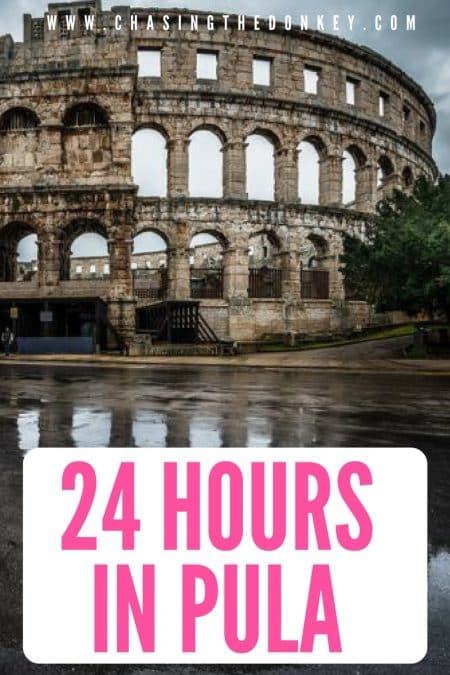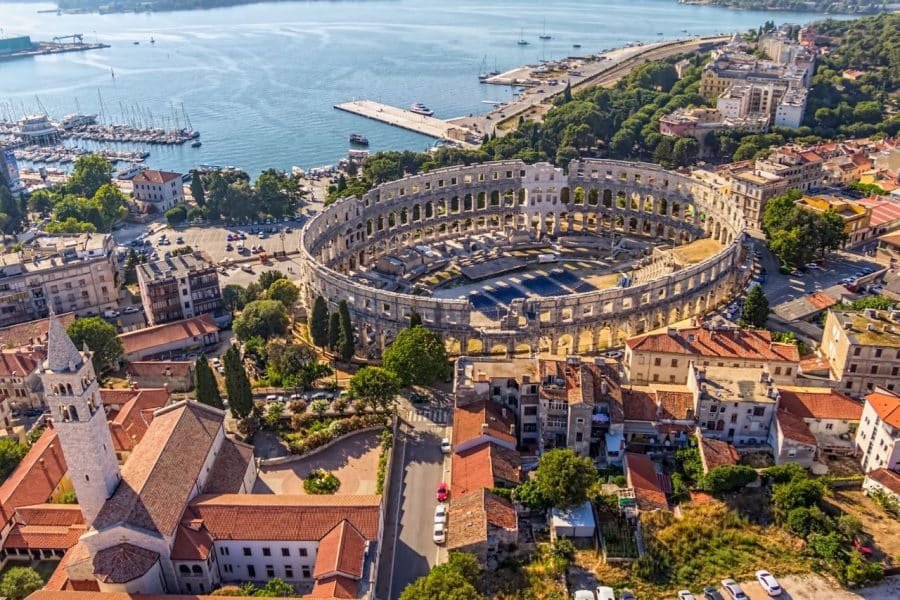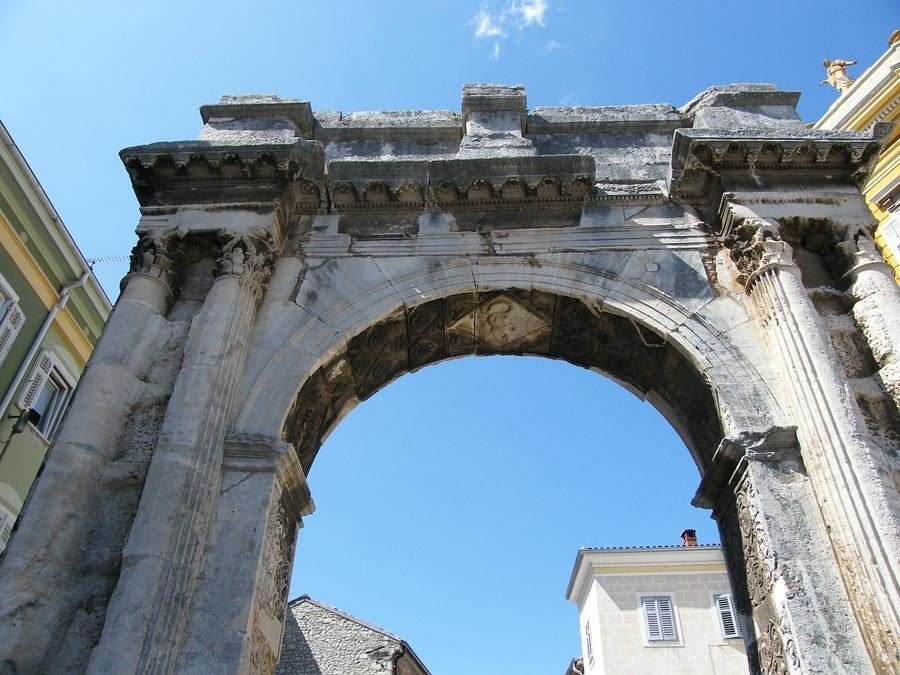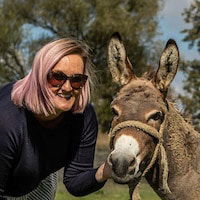Here is how to spend 24 Hours In Pula – the largest city in Istria. One day in Pula is hardly enough, but here is how to make the most of each minute.

At first sight, Pula may not seem to be an overly attractive option when choosing where to go in Croatia. But, did you know it’s the largest city in Istria and a sprawling industrial port town? You really should give Pula a chance. Because once you look past the factories and shipyards, you’ll see what makes this coastal town so fascinating.
Its strategic location at the southernmost point of the triangular peninsula of Istria, Pula has been a trade, military, and economic hub for a long, long time. And when we say “long,” we mean long. The town’s origins go way back to Roman times—in the 2nd century B.C., it already was a significant Roman outpost. After first being destroyed after the death of Julius Caesar, Pula grew in importance and reached its heyday in the 1st century A.D.
You’ll see some solid proof of this rich history when you spend 24 hours in Pula, which is more than enough time to visit all the town’s major attractions.
Skip Ahead To My Advice Here!
How To Do Pula In One Day
The place to be for tourists is Pula’s Old Town. While the rest of the town is pretty big, this historic core is very compact. You can easily walk around and through it in about an hour. It’s recommended to take your time, though, as there are a couple of landmarks that you’ll really want to visit.
Brands We Use And Trust
How To Do Pula In One Day: Morning

The number one reason why you should spend a day in Pula is this—the Amphitheater. There are tens of Roman amphitheaters scattered across Europe and North Africa, but this is one of the best-preserved. It’s also the sixth-largest.
Pula’s Roman Amphitheater is arguably the best place in Croatia to feel like you’re in Ancient Rome. (Diocletian’s Palace in Split is a close second, though.)
The structure is open every day, and you can explore it as you please. You can wander through its interior and climb on the seats. Completed around 80 A.D.—incidentally, around the same time as Rome’s Colosseum—this Amphitheater would stay in use for more than 300 hundred years. With a capacity of 25,000 spectators, this was a huge building even to Roman standards.
Make sure not to miss the museum exhibits located in the subterranean hall. This is where gladiators and animals alike were kept before, between, and after fights. There’s an extensive collection of amphorae in the museum, which is, surprisingly, dedicated to the production of olive oil and wine in Istria.
Fun Fact: the Pula Amphitheater also doubles as a venue for concerts, film festivals, sporting events, and performing arts.
You’ll probably spend a good chunk of the morning exploring the Amphitheater. Make your way directly south afterward to the Market Hall when you’re done.
The Market Hall is much younger than the Amphitheater, dating from the 1800s when Pula was an Austro-Hungarian territory. This is arguably the best place in town for lunch.
The ground floor is where you’ll find the actual market, where everything from meats and fish to cheeses and olive oil is sold. It’s a great place to fill up a picnic basket. If you’d rather order a prepared meal, you can do so at the food circus one floor up.
How To Do Pula In One Day: Afternoon

Belly filled, it’s time to use that energy to walk around the Old Town. This area circumvents the base of an ancient hill topped with a historic fortress. It’s an easy walk and impossible to get lost. Just walk around the hill, and you’ll hit all the highlights.
Starting at the Market Hall, it’s recommended to walk in a clockwise direction (to avoid backtracking toward the Amphitheater). On the way, you’ll come across several other Roman buildings as well as landmarks from other eras.
The first one you’ll see is the imposing Arch of Sergius, which marks the edge of the ancient Roman town. It’s an impressive triumphal arch dedicated to Lucius Sergius Lepidus, who fought with Augustus during the Roman civil wars after Julius Caesar’s death.
Continuing your walk through the arch, you’ll soon see the Basilica of St. Mary Formosa, a religious structure built by the Byzantines. In front of the basilica lies the Roman Floor Mosaic, a brilliant example of what lies underneath the Old Town’s roads and buildings.
Next up is the Forum, the town’s main square during Roman times and still serves the same purpose today. Look around and notice the Temple of Augustus and the Town Hall. This is also where the visitor center is located.
Past the Forum, the Cathedral with its bell tower is the most important religious building in Pula. Its origins dating from the 5th century; it intertwines two distinctly different architectural styles—Romanesque and Venetian Baroque. Visiting is free, so make sure to pop in for a look around.
Move This Adventure To Your Inbox & Get An Instant Freebie

No spam. Unsubscribe at any time.
How To Do Pula In One Day: Evening

It’ll be late afternoon by now, so make your way up the hill to Fort Kaštel on one of the many trails from the streets below. While there’s not much interest inside this old fortress, it’s still worth the climb for the fantastic views of the Old Town below. You can walk along the ramparts for different vantage points. Needless to say, this is a superb sunset-watching spot as well as getting online with your portable WiFi in Croatia and Facebook or Instagram your days best travel shots!
Head back down for dinner in the Old Town. Restaurant Jupiter will be an excellent choice if you’re feeling like a wood-fired pizza, or if you want to get out of town and find a more authentic meal, try here. For after-dinner drinks, head to Old City Bar.
Want to check out the city a little longer? Check out these great Pula accommodations!


You can also explore the life of James Joyce who lived there in 1904/5. Every June there is a Joyce festival which puts on a rich program and all for free.
Hi there! I am travelling to Istria for the first time in April over a weekend from Germany and not sure whether I should stay in Pula for 2 nights or Kamenjek. Any advice? :)
You should look up what pula means in Romanian and read the article again
Bahahahhaaaaaa